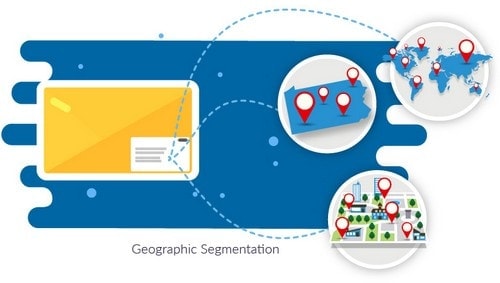Segmentation is dividing the similar customer into homogenous groups for the sake of classification and study. Customers are segmented in similar groups based on their likes or dislikes of a particular product.
This also helps the companies to target specific brands towards a specific group of customers and helps them to form a tailored marketing strategy. Organizations can use their sales, marketing, production, and other resources accordingly, once the customers are segregated. Customer segment helps the companies to understand their market and the demand of the market more effectively.
This is also useful when the organizations consider expansion of business in existing geography or when they enter new geographies. Customer segment helps them plan use of their internal resources more effectively. There are various categories of customer segmentation on different criteria. Following are the types of Customer Segment :
Table of Contents
1) Geographic Customer Segment
When the customers are segregated based on their location, it is termed as Geographic customer segmentation. The customer segments, in this case, can be country, region or city or even specific homes in particular towns.
This type of customer segment is used by both large and small businesses. Large businesses may choose wider geography for customer segmentation, for example, Subway will choose different countries to target certain products. In Arabic countries, pork is considered taboo, that is why Subway will customize its menu accordingly while in India Beef is considered taboo. Thus geographic segmentation will help the company to focus on particular customer segments and make tailored marketing strategies as needed.
In the case of small businesses, geographic segmentation is used for targeting specific customers for the specific area. This way the small businesses can plan their budget and avoid unwanted spending and impressions on unwanted customers.
For example, a fashion boutique in Paris can target only the customers in and around the shop and plan and advertise accordingly. Geographic customer segmentation can also be used for digital marketing where the websites can know their visitor by the customers IP address on their landing pages.
A geographic customer segment is very useful in digital marketing. For example, Google requires your location accessible via the browser to show ads that are more relevant and useful to you.
2) Demographic Customer Segment :
When the market is segmented based on certain characteristics of the audience it is called as demographic segmentation. These characteristics may include but not limited to ethnicity, gender, age, religion, marital status, education, occupation, income etc.
Demographic customer segmentation is considered the easiest type of customer segment and is useful in many ways. Luxury brands may choose to market according to the certain segment of people based on demographics like income more than $20,000 per month our colleges and tuitions may advertise two children between 17 to 22 year old.
Demographic segmentation is considered to be more effective when multiple segments are targeted at once. For example, Facebook uses multiple options for targeting on the basis of demographics of the people. A Mobile phone company can target Males (Gender) between the age group 22-29 (Age) living in metro cities of UK like London, Manchester etc. (Location), who are married (Marital status). Thus multiple segmentation yields effective and specific customer segment. Multiple segmentation also helps to effectively utilize
3) Behavioral Customer Segmentation :
Based on the decision making in the behavior of the customers which include but is not limited to lifestyle, purchases consumption and other various factors, behavioral customer segmentation is carried out. For example, It is seen that young adults from the age group of 18 to 22 tend to buy more of cosmetic products while older adults from the age group of 23 to 33 tend to buy branded products. Thus brand consciousness and awareness is seen in the latter group while for the younger group the focus is more on self-image. Similarity older customers are seen buying mood off basic necessities rather than splurging on the accessories.
Thus behavioral segmentation helps the market is to understand the behavioral pattern and target and position their products accordingly. So if the company wants to target younger audience the advertising would take his more on the colleges and stationery shops where the target audience have frequent visits, whether the company is targeting the young adults on the working class advertising would be more towards offices and on subways or different commutes which are frequented by these target audiences.
4) Firmographic Customer segmentation :
This type of customer segment is an exact replica of demographic segmentation. While firmographic takes into consideration organizations the demographics tend to cater more to the individuals. different factors are taken into consideration by segmenting the customers and Firmographic customer Segmentation.
The primary function of firmographic segmentation is to take into consideration the quantitative aspects of an industry like the size of a company, or the strength of the workers, and other quantitative aspects which wood is straight and how to address a small business.
5) Psychographic Customer Segmentation :
When the psychological aspects of the customer and his behavior are taken into consideration it is known as psychographic customer segmentation. various factors are taken into consideration while dividing the customers according to the psychographics like their values our lifestyle opinions and interests and other relevant factors. Psychographic segmentation is primary is used by large markets like Pharmaceutical markets especially over the counter products where the customers are divided according to their lifestyle and the products are targeted accordingly.
6) Smart customer segmentation :
This is a relatively new type of customer segmentation where and the companies divide the customers according to various categories and mix and match all the types of available customer segment combinations.
For example, customers are segmented according to age gender and their preference which is nothing but a combination of demographic and psychographic or behavioural segmentation. smart segmentation helps to target the audience more effectively and helps to minimize the unnecessary expenses incurred to target the nonaudiences.
Smart segmentation has proved more effective than a single category of customer segmentation since it focuses on my table respect of the customers rather than a single aspect.
Liked this post? Check out the complete series on Segmentation



great to meet you, may I ask you a question?